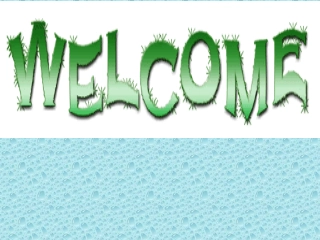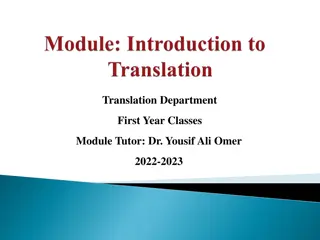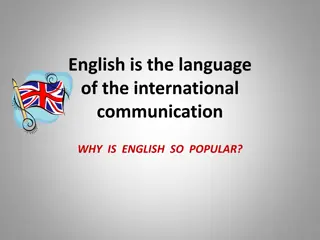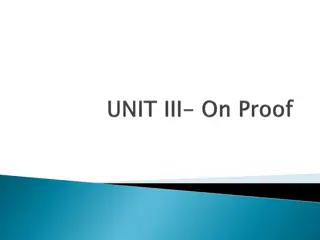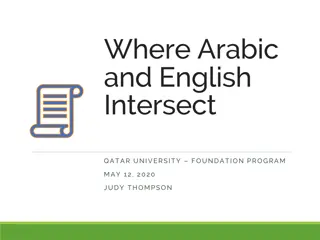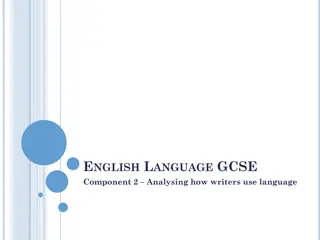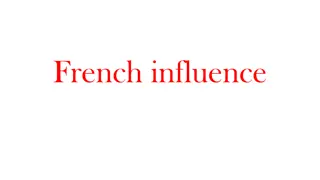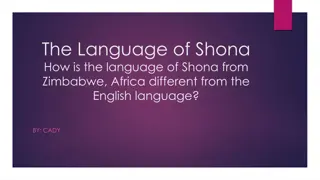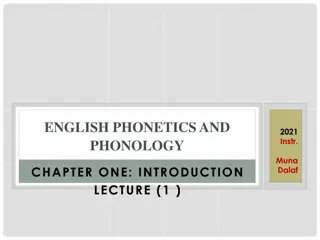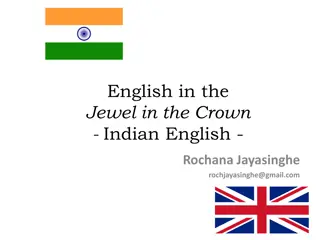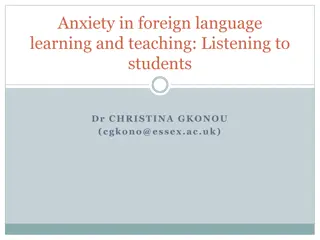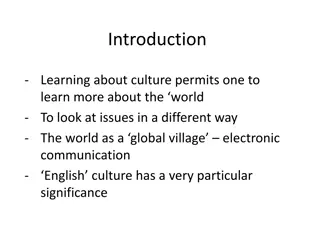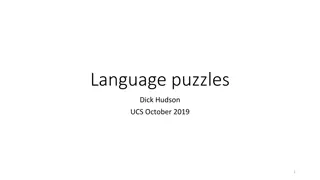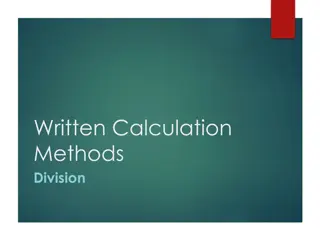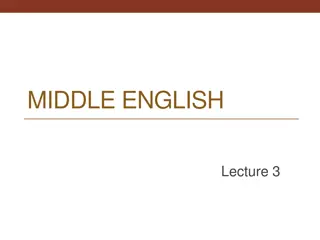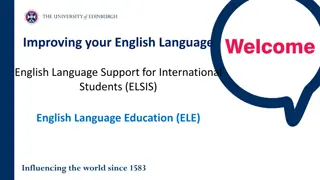English as a Global Language: Insights and Facts
Discover the significance of English among world languages, its global status, facts about Esperanto, and criteria for a language to be considered global. Explore the richness of English vocabulary and its prevalence worldwide. Dive into the details of speakers, status, features, and more.
Download Presentation

Please find below an Image/Link to download the presentation.
The content on the website is provided AS IS for your information and personal use only. It may not be sold, licensed, or shared on other websites without obtaining consent from the author.If you encounter any issues during the download, it is possible that the publisher has removed the file from their server.
You are allowed to download the files provided on this website for personal or commercial use, subject to the condition that they are used lawfully. All files are the property of their respective owners.
The content on the website is provided AS IS for your information and personal use only. It may not be sold, licensed, or shared on other websites without obtaining consent from the author.
E N D
Presentation Transcript
English among the world languages: Speakers, status and some of its features
Most spoken languages of the world by the number of first-language speakers Language Countries Speakers (millions) Mandarin Chinese 12 848 Spanish 31 399 English 101 335 Hindi 3 260 Arabic 60 242 Portuguese 12 203 Bengali 4 180 Russian 16 166 (Ethnologue 2014)
Most spoken languages by the total number of speakers Language Speakers (millions) Chinese (all) 1,380 English 850 Spanish 500 Arabic 490 Hindi 380 Russian 260 Portuguese 250 (Ethnologue 2015)
Some facts about Esperanto Meaning: One who hopes Creator: Polish-Jewish ophtalmologist, Ludwig Lazarrus Zamenhof When: Late 1870s early 1880s What is it like: Vocabulary from West European languages, grammar from Slavic and sounds like Italian Total number of speakers: about 2 million Native speakers: up to 2,000 It has become the 64thlanguage of the Google Translator
What is a global language? Criteria for a language to be classified as global: Geographic spread of its speakers Number of speakers Use as an official language in more than one country and in international organizations A vast body of literature written in this language Its utility as a lingua franca in a variety of domains, including diplomacy, trade, science, and others. Global languages are polycentric.
English as a global tongue English has official or special status in at least 75 countries with a total population of over two billion English is the official language of the UN, EU and many other international organizations Speakers of English as a 2ndand foreign language greatly outnumber those who speak it as a 1stlanguage
How rich is English vocabulary? Oxford English Dictionary contains more than 600, 000 definitions; more than 500 new words, phrases and senses were added in 2015 Webster s New World College Dictionary - 160,000 definitions Chambers Dictionary of Science and Technology over 49,000 entries
How many words do we use in our first language? do we use in our second or foreign language? do children use?
What is the vocabulary size of an average speaker? Most adult native test-takers range from 20,000 35,000 words Average native test-takers of age 4 already know 5,000 words The most common vocabulary size for foreign test-takers is 4,500 words Foreign test-takers tend to reach over 10,000 words by living in the country where the language is spoken
Commodification of language Language forms part of the symbolic capital that can be mobilized in markets as interchangeable with forms of material capital (Bourdieu 1977, 1982.) How one speaks and writes is one basis for deciding one's worth as a scholar, an employee, or a potential marriage partner (Monika Heller, Canadian sociolinguist 2010).
Why is there so much discussion about commodification of language today? Globalizing economy requires the management of communication Computerization of the work processes requires new language and literacy skills Due to the saturation of markets niche markets are being developed often requiring a focus on linguistic specificity and the use of symbolic, often linguistic, resources to add value to standardized products.
In the emerging knowledge economy Language command is viewed as a technical skill Language has become a means through which work is accomplished (the work process) and as a product of labor (the work product) There is tension between variability (niche markets) and MacDonaldization - imposition of the tastes and habits of the English-speaking world on the rest of the world population.
Simplicity of form Computer (sing.) - Computers (pl.) Computer s - Computers (possessive case) Ride rode ridden riding Bad worse the worst Yourself yourselves
Simplicity of Form: Verbs and nouns having the same form Alert Breed Call Claim Deal End Farm Gossip House Iron Love Make Order Play Rank Stress Thunder Use Walk Work
Simplicity of form: The same form, different functions The table was round (adj.) He turned round (adv.) He ran round the garden (prep.) He bought a new round of drinks (n.) The car began to round a bend (v.)
The pitfalls of English spelling Fell full, foil, fowl, foal, fall, fill, feel, fool, fuel Physics, offer, enough Occur, chemist, acclaim, circuit, kernel, sack , quit
Borrowing from other languages Algebra Arabic Boss Dutch Love Old English Cigar Spanish Piano Italian Tea Chinese Yoghurt Turkish Astronomy Classical Greek Paprika Hungarian Sputnik Russian Bungalow Hindi Karate Japanese Caf Modern French Robot Czech
Which is the correct way/s of saying things? Shall we (accept expect except) his invitation to diner? His words (effected affected) me greatly. What was the country s (economic economical economically) growth in the last decade? You are quite safe. The material is (flammable - inflammable non-flammable).
Which is the correct way/s of saying things? The report (inferred implied) that the accident could have been avoided. The (principal principle) cities are connected by the railroad. Israel is proud of (its - his her) history. Athletics (are is) a popular sport. He never said (something anything nothing) about it.
Which is the correct way/s of saying things? In the 1950s polio was (endemic epidemic) among children in Europe. The (incredible incredulous) reporters laughed at the manager s explanations of how the funds disappeared. There was no one on the seat (beside besides) me.
Which is the correct way/s of saying things? You (rose arose raised) an interesting question at the meeting yesterday. The ambassador (ensured insured assured) the Prime Minister of his loyalty. I feel (bad badly) about the whole affair.
It depends on you whether you see this course as this:


